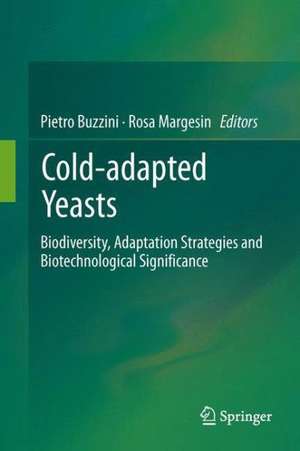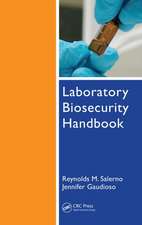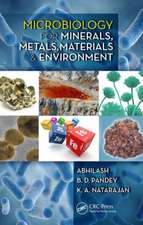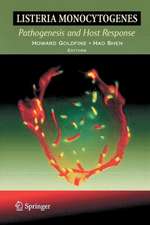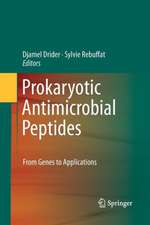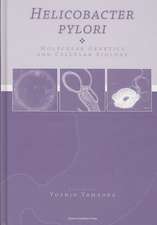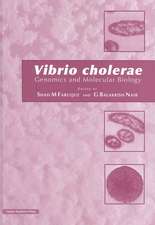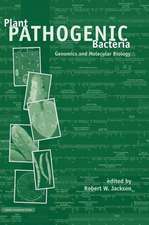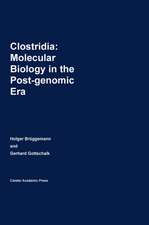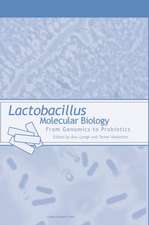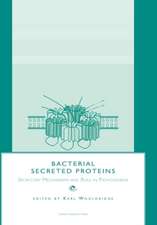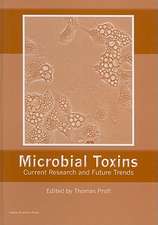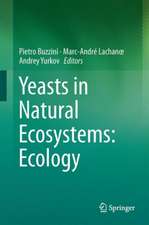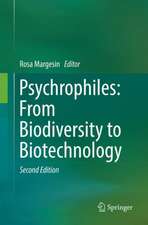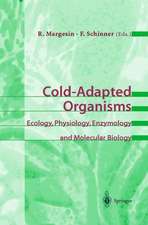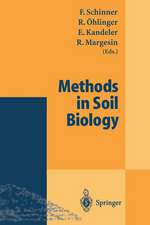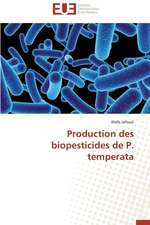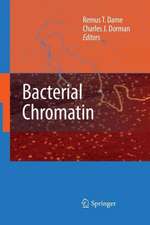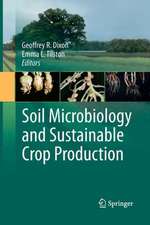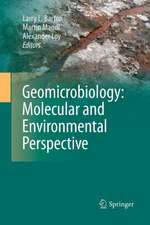Cold-adapted Yeasts: Biodiversity, Adaptation Strategies and Biotechnological Significance
Editat de Pietro Buzzini, Rosa Margesinen Limba Engleză Hardback – 21 oct 2013
This book presents our current understanding of the diversity and ecology of cold-adapted yeasts in worldwide cold ecosystems, their adaptation strategies, and their biotechnological significance. Special emphasis is placed on the exploitation of cold-adapted yeasts as a source of cold-active enzymes and biopolymers, as well as their benefits for food microbiology, bioremediation and biocontrol. Further, aspects of food biodeterioration are considered.
| Toate formatele și edițiile | Preț | Express |
|---|---|---|
| Paperback (1) | 957.13 lei 6-8 săpt. | |
| Springer Berlin, Heidelberg – 27 aug 2016 | 957.13 lei 6-8 săpt. | |
| Hardback (1) | 961.72 lei 6-8 săpt. | |
| Springer Berlin, Heidelberg – 21 oct 2013 | 961.72 lei 6-8 săpt. |
Preț: 961.72 lei
Preț vechi: 1172.83 lei
-18% Nou
Puncte Express: 1443
Preț estimativ în valută:
184.03€ • 196.79$ • 153.44£
184.03€ • 196.79$ • 153.44£
Carte tipărită la comandă
Livrare economică 17 aprilie-01 mai
Preluare comenzi: 021 569.72.76
Specificații
ISBN-13: 9783642396809
ISBN-10: 3642396801
Pagini: 564
Ilustrații: XI, 549 p. 61 illus., 28 illus. in color.
Dimensiuni: 155 x 235 x 36 mm
Greutate: 0.91 kg
Ediția:2014
Editura: Springer Berlin, Heidelberg
Colecția Springer
Locul publicării:Berlin, Heidelberg, Germany
ISBN-10: 3642396801
Pagini: 564
Ilustrații: XI, 549 p. 61 illus., 28 illus. in color.
Dimensiuni: 155 x 235 x 36 mm
Greutate: 0.91 kg
Ediția:2014
Editura: Springer Berlin, Heidelberg
Colecția Springer
Locul publicării:Berlin, Heidelberg, Germany
Public țintă
ResearchCuprins
Cold-Adapted Yeasts: a Lesson from the Cold and a Challenge for the XXI Century.- Methods for the Isolation and Investigation of the Diversity of Cold-Adapted Yeasts and their ex situ Preservation in Worldwide Collections.- Cold-Adapted Yeasts in Arctic Habitats.- Cold-Adapted Yeasts in Antarctic Deserts.- Cold-adapted yeasts in Alpine and Apennine glaciers.- Cold-Adapted Yeasts in Patagonian Habitats.- Cold-Adapted Yeasts in Deep-Sea Environments .- Black Yeasts in Cold Habitats.- Production of Pigments and Photo-Protective Compounds by Cold-Adapted Yeasts.- Changes in Lipids Composition and Fluidity of Yeast Plasma Membrane as Response to Cold.- Cold-Shock Response and Adaptation to Near-Freezing Temperature in Cold-Adapted Yeasts.- Production of Antifreeze Proteins by Cold-Adapted Yeasts.- Role of Sterol Metabolism and Endoplasmic-Reticulum-Associated Degradation (ERAD) of Proteins in Cold Adaptation of Yeasts.- Subzero Activity of Cold-Adapted Yeasts.- Fundamentals of Cold-Active Enzymes.- Cold-Active Yeast Lipases: Recent Issues and Future Prospects.- Miscellaneous Cold-Active Yeast Enzymes of Industrial Importance.- Production of Polymers and other Compounds of Industrial Importance by Cold-Adapted Yeasts.- Low-Temperature Production of Wine, Beer and Distillates using Cold-Adapted Yeasts.- Cold-Adapted Yeasts as Biocontrol Agents: Biodiversity, Adaptation Strategies and Biocontrol Potential.- Bioremediation and Biodegradation of Hydrocarbons by Cold-Adapted Yeasts.- Heterologous Expression of Proteins from Cold-Adapted Yeasts in Suitable Hosts: Methods and Applications.- Food Spoilage by Cold-adapted Yeasts.
Textul de pe ultima copertă
Yeasts are a versatile group of eukaryotic microorganisms, exhibiting heterogeneous nutritional profiles and an extraordinary ability to survive in a wide range of natural and man-associated ecosystems, including cold habitats. Cold-adapted yeasts inhabit numerous low-temperature environments where they are subjected to seasonal or permanent cold conditions. Hence, they have evolved a number of adaptation strategies with regard to growth and reproduction, metabolic activities, survival and protection. Due to their distinctive ability to thrive successfully at low and even subzero temperatures, cold-adapted yeasts are increasingly attracting attention in basic science and industry for their enormous biotechnological potential.
This book presents our current understanding of the diversity and ecology of cold-adapted yeasts in worldwide cold ecosystems, their adaptation strategies, and their biotechnological significance. Special emphasis is placed on the exploitation of cold-adapted yeasts as a source of cold-active enzymes and biopolymers, as well as their benefits for food microbiology, bioremediation and biocontrol. Further, aspects of food biodeterioration are considered.
This book presents our current understanding of the diversity and ecology of cold-adapted yeasts in worldwide cold ecosystems, their adaptation strategies, and their biotechnological significance. Special emphasis is placed on the exploitation of cold-adapted yeasts as a source of cold-active enzymes and biopolymers, as well as their benefits for food microbiology, bioremediation and biocontrol. Further, aspects of food biodeterioration are considered.
Caracteristici
Provides an overview of the biology and potential biotechnological applications All Chapters were written by internationally recognized experts Suitable for microbiologists, biochemists, ecologists, environmental scientists and biotechnologists in academia and industry Includes supplementary material: sn.pub/extras
